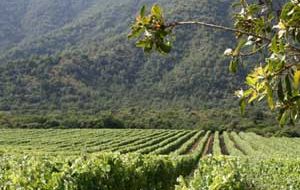MercoPress. South Atlantic News Agency
Chilean wine industry and pork plant clash over land planning and use
 Wine production is a crucial part of the Casablanca Valley economy
Wine production is a crucial part of the Casablanca Valley economy Winemakers in Chile’s Casablanca Valley have been fighting pork-producing behemoth Expo Pork Meat for the past two weeks, as the company looks to construct a pork-processing plant in the region.
The local wine industry cites fears of decreased tourism to the region and soil contamination, which would affect wine production, if a processing plant were introduced to the area. As a result, the Environment Ministry has stepped in to evaluate the winemakers’ concerns.
Giorgianna Cúneo, president of the Association of Casablanca Winemakers, along with local winemakers and Casablanca Mayor Manuel Jesús Vera, met with Environment Minister María Ignacia Benítez to discuss the issue. Their objective was to raise concerns about the impact of an invasive industry in a region where dozens of wine exporters, producing premium wines to international standards, earn their livelihoods. An additional fear, besides environmental impact, is a decrease of foreign investment in the valley, a key resource for its wine irrigation system and infrastructure.
The dispute gained steam last week when CONAMA, Chile’s national environmental commission, approved Expo Pork Meat’s project proposal, although the commission had originally rejected it in 2008. In response, the valley’s winemakers took the debate to court. They appealed to the tribunal courts to prohibit the project from going ahead with only CONAMA’s approval. CONAMA approved the project, after evaluating the results of an environmental impact study conducted last year. Casablanca Valley winemakers are looking to appeal the case to the Supreme Court.
“Wine production is a crucial part of the Casablanca Valley’s economy,” Cúneo said. “Before the plant is built and pork processing goes ahead, we ask that an environmental impact study be done with local citizen participation.”
Many project leaders and investors, in support of Expo Port Meat, are becoming increasingly annoyed with the delay in the plant’s construction. Miguel Pinto, a partner at Expo Pork Meat, said the only obstacle to beginning construction is the legal battle with the local wine industry.
“Investors are very annoyed,” he said. “We will be using German technology in the processing plant – technology that is proven to prevent environmental contamination and is used widely throughout Europe, even in wine-producing regions.”
The proposed plant, to be built halfway between Valparaíso and San Antonio, would process and export up to 1,500 pigs daily, but would not raise the pigs in the same location. The pigs would be brought in from nearby pig farms.
For some Casablanca Valley locals, the issue goes much deeper than the construction of a processing plant in their home region. Some see the problem as a prime example of the lack of regulation for land use and rural zone protection in Chile. In Chile’s cities, regulations that define proper land use and protect “green spaces” have already been developed, but are nonexistent in rural areas.
The National Agriculture Society has also jumped into the debate. At a recent meeting, the society discussed various solutions to the problem.
“We are still evaluating solutions for the issue, because obviously different agricultural sectors have to coexist,” said Luis Mayol, the society’s president.
“I believe that we have much more discussion about land use designation in general,” he said.
“What is happening today in Casablanca could happen tomorrow in Colchagua, Maule, Leyda or Limarí.”
By Christine Mehta – Santiago Times




Top Comments
Disclaimer & comment rulesCommenting for this story is now closed.
If you have a Facebook account, become a fan and comment on our Facebook Page!